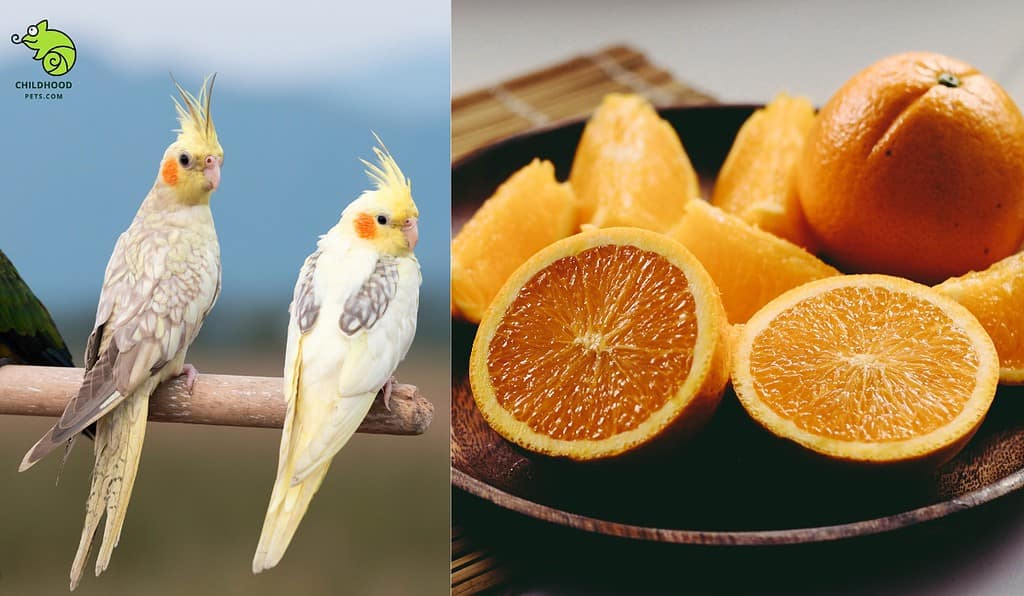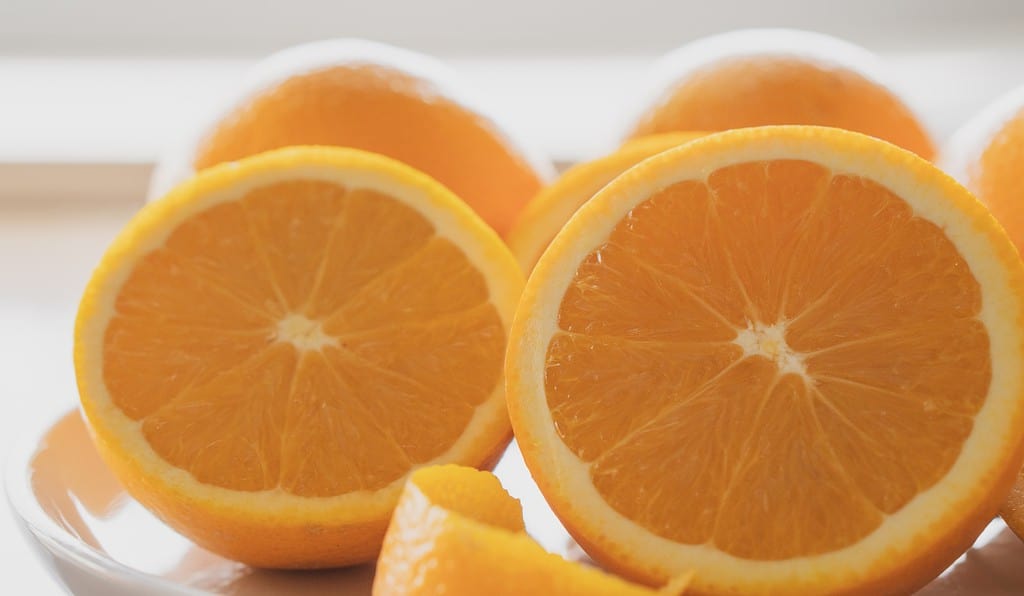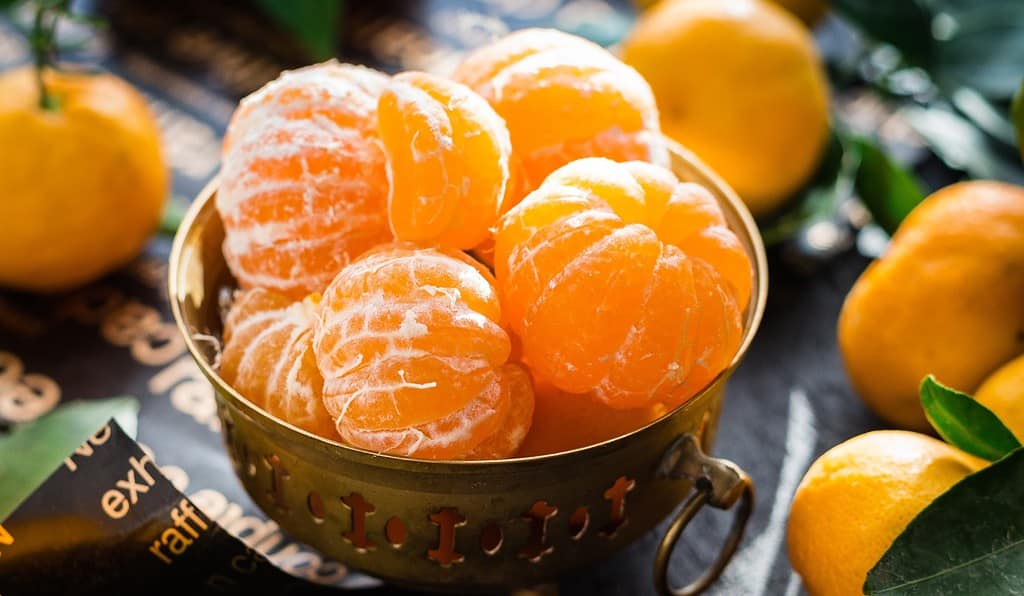
Oranges, with their vibrant color and tangy flavor, are a favorite for many of us. But if you’re a bird owner, especially of the delightful cockatiel, you might have paused before sharing a slice with your feathery friend. Can these little birds enjoy the citrusy delight without any repercussions? It’s a question that’s fluttered the minds of many cockatiel enthusiasts.
As a general rule, cockatiels can consume oranges in moderation. These fruits offer a lot of benefits, including essential vitamins, minerals, fiber, and antioxidants. When incorporated into their diet, oranges can positively impact a cockatiel’s eyesight, feathers, skin, immune system, and heart.
Ready to dive deeper into the world of cockatiels and oranges? Let’s embark on this juicy journey together and uncover the dos and don’ts of feeding oranges to our chirpy companions!
🤔 Did You Know? Cockatiels are native to Australia and are known for their vibrant personalities and ability to mimic various sounds.
The Nutritional Value of Oranges for Cockatiels

Oranges, as many of us know, are a powerhouse of nutrition. They’re not just a refreshing treat on a hot day but are packed with vitamins and minerals essential for our health. But what about for our cockatiel friends?
| Fruit | Vitamin C | Vitamin B | Potassium | Other Nutrients |
| Oranges | High | Moderate | High | Fiber, Antioxidants |
| Apples | Moderate | Low | Moderate | Fiber |
| Bananas | Low | High | Very High | Magnesium |
| Strawberries | Very High | Low | Low | Antioxidants |
| Blueberries | High | Low | Low | Antioxidants |
- Vitamin C: This vitamin is a real stress-buster. In my years of practice, I’ve noticed that cockatiels with a sufficient Vitamin C intake tend to be more relaxed and less prone to stress-related behaviors.
- Vitamin B (Thiamin): Essential for the nervous system. A deficiency can lead to a range of neurological issues. Thankfully, oranges provide a decent amount of this vitamin.
- Potassium: This mineral plays a crucial role in maintaining a healthy metabolism and robust bones. Plus, it’s great for heart health.
- Other Nutrients: Oranges also offer a good dose of fiber, which aids digestion, and antioxidants that support overall health.
🍊 Tip: When introducing oranges to your cockatiel’s diet, always ensure they are fresh and free from pesticides. Organic oranges are the best choice!
Benefits of Oranges for Cockatiels
Absolutely! Cockatiels can indeed enjoy the juicy goodness of oranges. But like everything, moderation is key. Here are the top benefits of oranges for our feathered friends:
- Eyesight Enhancement: The vitamins in oranges support eye health, ensuring your cockatiel’s vision remains sharp.
- Feather Health: Ever noticed how some cockatiels have shinier feathers? A balanced diet, including fruits like oranges, can be the secret.
- Skin Health: Just as we need hydration for our skin, cockatiels benefit from the moisture and vitamins in oranges.
- Immune System Boost: With the high Vitamin C content, oranges can give your bird’s immune system a little extra shield against illnesses.
- Heart Health: The potassium in oranges supports heart function, ensuring your cockatiel’s tiny heart beats healthily.
I’ve always emphasized the importance of a varied diet. While oranges are beneficial, they should be a part of a balanced diet, ensuring your cockatiel gets all the nutrients it needs. So, the next time you’re enjoying an orange, remember, you can share a slice with your feathery friend!
How to Safely Introduce Oranges to Cockatiels
Introducing a new food to your cockatiel’s diet can be both exciting and a tad nerve-wracking. I get it. Over the years, many bird owners have approached me with that familiar look of curiosity mixed with concern. “How do I introduce oranges to my cockatiel safely?” they’d ask. Well, you’re in luck! Here’s a step-by-step guide to ensure your feathered friend gets to enjoy this citrusy treat without a hitch:
- Select Fresh Oranges: Always opt for fresh, ripe oranges. Avoid those with any signs of mold or spoilage.
- Wash Thoroughly: Given the concerns about pesticides and chemicals, it’s crucial to wash the oranges under running water. If possible, choose organic oranges to minimize these risks.
- Peel and Remove Seeds: Cockatiels can’t digest orange seeds, and the peels might be too tough for them. So, ensure you remove both.
- Cut into Manageable Pieces: Tiny, bite-sized pieces are perfect. It makes it easier for the cockatiels to eat and reduces the risk of choking.
- Serve in a Clean Dish: Place the orange pieces in a clean dish. Remember, hygiene is paramount!
- Monitor Their Reaction: The first time you introduce oranges, keep an eye on your cockatiel. See how they react and ensure they’re enjoying the treat without any discomfort.
Now, while serving plain orange pieces is great, why not get a bit creative? Here are some fun ways to serve oranges to your cockatiel:
- Orange Kabobs: Skewer some orange pieces with other safe fruits like apples or melons.
- Fruit Salad: Mix tiny pieces of oranges with other bird-safe fruits.
- Frozen Orange Treats: In the summer, freeze orange pieces for a refreshing treat.
- Mashed Oranges: Some cockatiels prefer their fruit mashed. It’s worth a try!
“Remember, variety is the spice of life, even for our feathered friends!”
Potential Risks and Considerations
The number one thing new bird owners ask me is about the safety of the foods they’re introducing. While oranges are a delightful treat, it’s essential to be aware of potential risks.
Here are the top three concerns when feeding oranges to cockatiels:
- Overfeeding Leads to High Sucrose Intake: Oranges contain natural sugars. While they’re not harmful in moderation, excessive consumption can lead to health issues.
- Pesticides on Non-Organic Oranges: As I mentioned earlier, always wash oranges thoroughly. If possible, go for organic options.
- Moderation is Key: Like all treats, oranges should be given in moderation. They shouldn’t replace the primary diet of seeds, pellets, and other essential nutrients.
Negative Effects Associated With Oranges
While oranges can be a delightful treat for cockatiels, it’s essential to be aware of potential pitfalls. Just like any food, there are some considerations to keep in mind. Here are the potential negative effects of feeding oranges to cockatiels:
- Excessive Sugar and Carbohydrate Intake: Oranges, like many fruits, contain natural sugars. While a small amount can be beneficial, overfeeding can lead to obesity and other health issues in cockatiels. It’s similar to how we humans love our sweet treats but know we shouldn’t indulge too often.
- Pesticides and Chemicals: Non-organic oranges might be treated with pesticides and other chemicals. These can be harmful to cockatiels if ingested. Over the years, I’ve advised countless bird owners to either opt for organic oranges or ensure they wash the fruit thoroughly before serving.
- Moderation is Crucial: This can’t be stressed enough. While oranges are safe for cockatiels, they should be given in moderation. Think of it as a treat, not a staple in their diet.
🚫 Tip: Always avoid giving your cockatiel the seeds of any fruit, as they can be a choking hazard or contain harmful substances.
Preparing Oranges for Cockatiels

Introducing your cockatiel to oranges requires a bit of preparation. But don’t fret; it’s pretty straightforward. Here’s a step-by-step guide to ensure your bird gets the best out of this citrus treat:
- Choose Fresh Oranges: Always start with fresh, ripe oranges. Avoid any that show signs of spoilage.
- Wash Thoroughly: Rinse the oranges under running water to remove any pesticides or dirt. If you’ve opted for organic oranges, this step is still essential to remove any dirt or contaminants.
- Peel and Deseed: Cockatiels might find it challenging to digest orange seeds and peels. So, it’s best to remove them.
- Cut into Small Pieces: Slice the orange into bite-sized pieces, ensuring they’re easy for your cockatiel to handle.
- Serve in a Clean Dish: Always use a clean dish to serve the orange pieces. Hygiene first!
And if you’re feeling a tad creative, here are some serving suggestions:
- Orange Smoothie: Blend orange pieces with other bird-safe fruits for a refreshing treat.
- Mixed Fruit Salad: Combine orange pieces with other fruits like apples or melons.
- Frozen Orange Delight: Freeze tiny orange pieces for a cool summer treat.
- Mashed Oranges: Some cockatiels prefer their fruit mashed up. Give it a try and see if yours does too!
Quantity and Frequency of Feeding Oranges
Now, you might be wondering, “How much orange can I give my cockatiel?” It’s a valid question. Here’s a comparison of the recommended quantity of oranges to other fruits:
| Fruit | Recommended Quantity for Cockatiels |
| Oranges | 1-2 small pieces, 2-3 times a week |
| Apples | 1-2 slices, 2-3 times a week |
| Bananas | 1 small slice, 1-2 times a week |
| Strawberries | 1-2 berries, 2-3 times a week |
| Blueberries | 3-4 berries, 2-3 times a week |
Remember, variety is the spice of life. While it’s okay to give your cockatiel oranges, ensure they get a varied diet. This not only provides them with all the essential nutrients but also keeps mealtime exciting for them. In my experience guiding bird owners, I’ve found that a varied diet often leads to happier, healthier birds. So, go ahead and introduce your feathered friend to the world of fruits, but always with care and moderation.
Other Parts of the Orange: Peels, Seeds, and Juice
Oranges are a multifaceted fruit. Beyond the juicy segments we often enjoy, there are other parts like the peels, seeds, and even the juice. But when it comes to our feathered friends, the cockatiels, can they enjoy these parts as well?
Orange Peels: The vibrant orange skin might look tempting, but it’s not the best for cockatiels. While not toxic, the peels can be tough and might contain pesticides, especially if they’re not organic. In my years of veterinary practice, I’ve always advised bird owners to steer clear of giving orange peels to their pets.
Orange Seeds: These tiny seeds can be a choking hazard. Moreover, they don’t offer any nutritional benefits to cockatiels. It’s best to remove them before offering any orange segments.
Orange Juice: A little sip might not harm, but it’s essential to ensure it’s fresh and without any added sugars or preservatives. However, the whole fruit is always a better option than juice. It provides dietary fiber and ensures the bird doesn’t consume too much sugar.
| Orange Part | Safe for Cockatiels | Notes |
| Peels | No | Might contain pesticides; tough to digest. |
| Seeds | No | Choking hazard; no nutritional value. |
| Juice | In moderation | Ensure no added sugars or preservatives. |
Frequently Asked Questions
What Fruits Can Cockatiels Not Eat?
Certain fruits might not sit well with cockatiels. Here’s a list of fruits you should avoid:
- Avocado: Contains persin, which can be toxic to birds.
- Grapes: Some studies suggest they might be harmful.
- Cherries: The pits contain cyanide.
- Raw Apples: The seeds can be toxic in large quantities.
- Rhubarb: The leaves especially are toxic to birds.
What Fruits Are Good For Cockatiels?
Cockatiels can enjoy a variety of fruits. Here are some they’ll love:
- Bananas: Packed with essential vitamins and minerals.
- Berries (strawberries, blueberries): Rich in antioxidants.
- Mango: A tropical treat filled with vitamins A and C.
- Papaya: Contains enzymes beneficial for digestion.
- Pineapple: Another tropical delight that’s both tasty and nutritious.
Personal Experience
I remember a sunny afternoon when a concerned bird owner, Clara, rushed into my clinic with her cockatiel, Sunny. She was worried because Sunny had nibbled on some orange peels from her fruit bowl. Clara had read somewhere that citrus fruits might not be the best for birds and was understandably anxious.
After a thorough check-up, Sunny was given the all-clear. I reassured Clara that while orange peels aren’t the ideal treat for cockatiels due to potential pesticides, an occasional nibble wouldn’t harm them. However, it’s always best to offer the fleshy part of the orange, ensuring it’s free from seeds.
From this experience, here are some key takeaways I’d like to share:
- Always Monitor New Foods: Whenever introducing a new food to your cockatiel, keep an eye on their reaction.
- Research Before Feeding: It’s essential to know which foods are safe and which aren’t. When in doubt, consult with a vet.
- Fresh is Best: Always offer fresh fruits, ensuring they’re clean and free from seeds or any harmful parts.
- Moderation is Key: Even with safe fruits, moderation ensures a balanced diet.
- Stay Calm and Consult: If you ever suspect your bird has consumed something harmful, stay calm, and seek expert advice.
🐦 Expert Advice: Always keep a list of emergency vet contacts handy. Quick action can make all the difference in case of accidental ingestion of harmful substances.
Conclusion
Understanding the dietary needs of cockatiels is crucial for every bird owner. Oranges, like many fruits, offer a plethora of benefits, but it’s essential to serve them correctly. The fleshy part of the orange is packed with nutrients beneficial for cockatiels, but always ensure it’s seed-free.
While the benefits of oranges are numerous, from boosting the immune system to enhancing feather health, it’s equally important to be aware of the potential risks. Always opt for organic oranges to minimize the risk of pesticides and remember that moderation is the key to a balanced diet.
I encourage all bird enthusiasts to share their experiences and stories. After all, we learn best from each other’s experiences. So, next time you’re enjoying a juicy orange, remember, with a little preparation, your feathery friend can join in the fun too!
